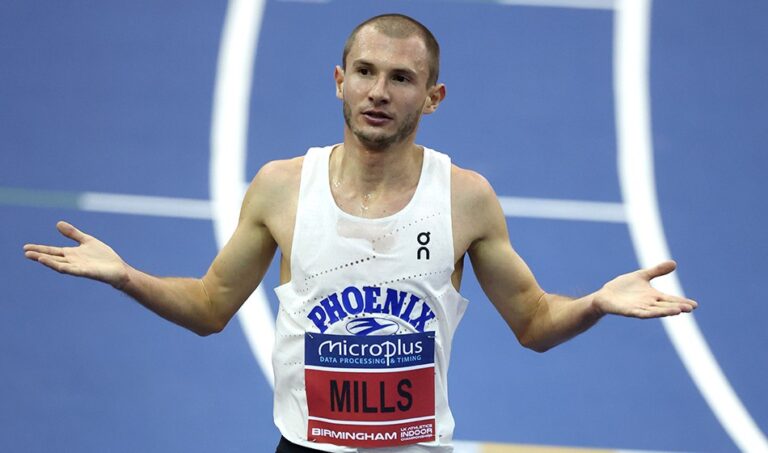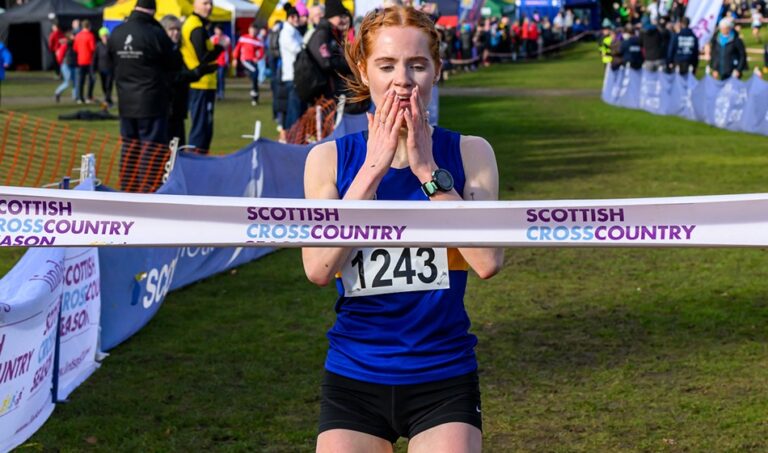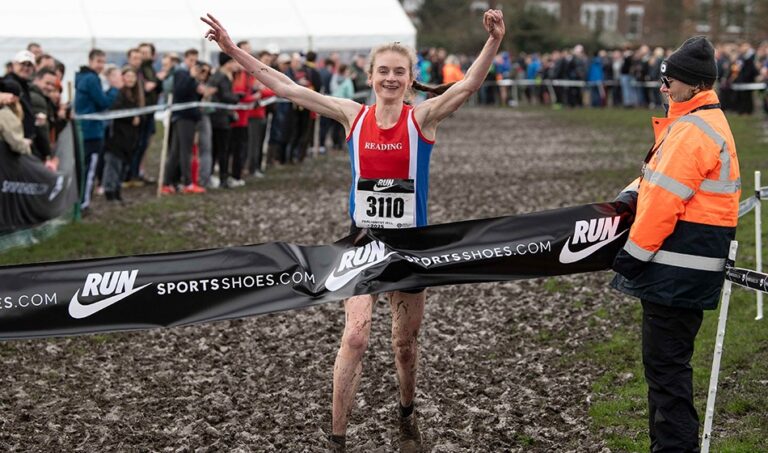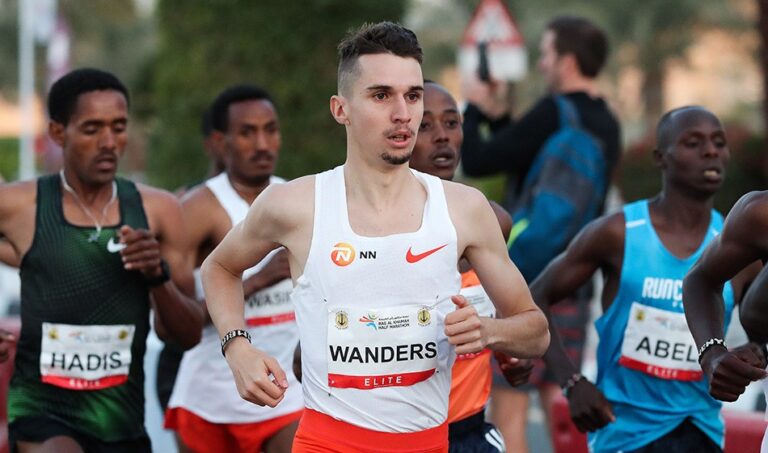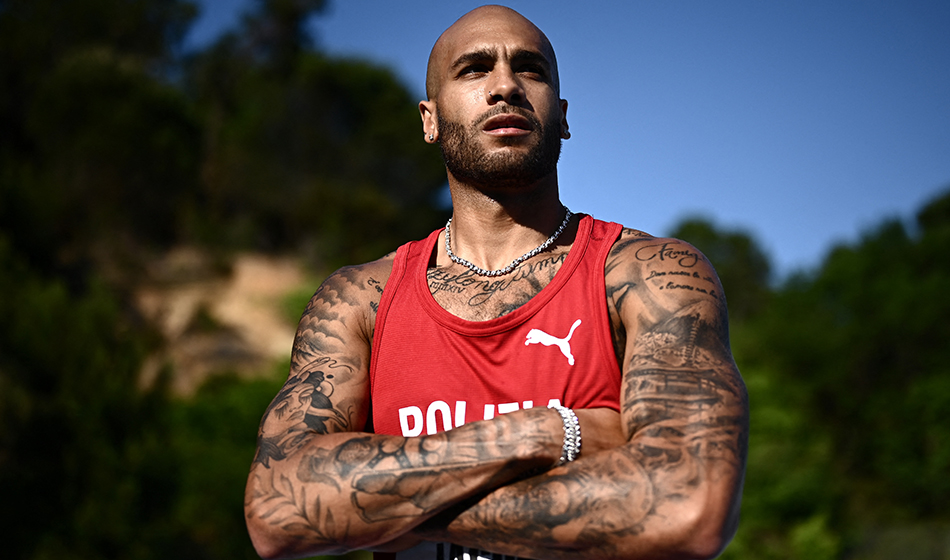
The Olympic and European 100m champion hopes to retain both of his gold medals this summer
Marcell Jacobs believes that what ultimately counts is the medal around your neck.
The 29-year-old Italian is the Olympic and European 100m champion and, over the next few months, could win them both again.
Marcell Jacobs
It’s a unique opportunity. Jacobs will defend his European sprints title in front of a home crowd at the Stadio Olimpico. Unsurprisingly the Italian is the poster boy of the championships and his face is seen on the advertising for it across Rome.
Then, in August, Jacobs will aim to become a double Olympic 100m champion in consecutive Games. If he claims gold, the Italian will be the third person in history after Carl Lewis and Usain Bolt to achieve the feat.
Some argue he already re-wrote the record books three years ago.
At the Tokyo Olympics, Jacobs became the first ever Italian to win the 100m at the Games and was part of the quartet that struck gold in the 4x100m relay. Safe to say, his world changed overnight. He’d claimed a world indoor 60m title and broke the Italian 100m record that season but becoming Olympic champion in two events created another level of exposure for the sprinter. His life was studied more intensely.
Subsequently, Jacobs’ association with nutritionist Giacomo Spazzini, who was implicated in a police investigation into the distribution of steroids, created difficult questions. Spazzini was cleared in a criminal court but reportedly handed a 15-year doping ban that was later rescinded on appeal. Jacobs was never suspected of wrongdoing.
Marcell Jacobs (100m)
Jacobs tells AW that criticism at first “did bother me and I let it bother me” but now the Italian “knows what I’ve done to get where I am.”
Three years on and ahead of a home European Championships, Jacobs is training out in Rieti. The stadium has hosted eight world records and has recently enjoyed a track upgrade with the installation of a new CONIPUR Vmax surface.
Now being coached by Rana Reider, Jacobs is training alongside the likes of Andre De Grasse, Trayvon Bromell and Nia Ali, to name a few.
With Zharnel Hughes pulling out of the European Championships, Jacobs – after a season’s best of 10.03 at the Oslo Diamond League – will go into it as one of the favourites. It would mean a lot to him to retain his crown in Italy.
The last time he ran a sub-10 100m was the 9.95 that took him to European glory at Munich 2022. When the pressure is on, he usually delivers.
We caught up with the Italian ahead of the championships in Rome, 50 years on from the last edition in the “Eternal City”. Speaking via a translator, Jacobs tackled topics ranging from the current 100m landscape and Netflix to what got him into track and field in the first place.

Marcell Jacobs (Getty)
Ahead of the European Championships, you must be so excited to represent Italy on home turf.
The European Championships at home are always welcome and it’ll be exciting for me. Racing at the Stadio Olimpico means that there will be a great atmosphere. I can’t wait to see everyone in the stands and to feel the excitement and electricity that’s going to be in the stadium.
There are two sides to it though. There will be an incredible energy present but there will also be pressure because I’m the defending European 100m champion and people will be expecting a lot from me. They want great things. There will be pressure to perform.
When the pressure has been at its greatest, you’ve collected an Olympic 100m, 4x100m and European 100m gold medal. Where does that mindset come from?
It hasn’t always been like that. In the beginning of my athletics career, it was much more difficult to put together a performance. I had to work hard to coordinate my mind and body. I worked with a mental coach [Nicoletta Romanazzi] and she really helped me put these two aspects together ahead of competitions.
I started working with her at the end of 2020. I’ve had a lot of growth, both in the sport and on a personal level, since working with her. Having worked on both my mind and body, I realised that my body is performing during training but that my mind has helped push me to new heights and got me to where I am now.
Why did you choose to join Rana Reider’s training group?
It was very important when I chose a new coach and in an Olympic year. So I chose someone that had to be prepared and that was Rana Reider. He’s trained so many Olympic champions so that was crucial for me. Training in a group environment feels different as I’ve always trained alone. Working in a group is very functional and I have great partners around me during training. It’s brilliant ahead of races.
It was a fundamental change for me but I did it because working in a group helps pull out that extra percentage that you can’t do on your own. The competition pushes you and it’s hard to do by yourself. If I had the choice to train on my own again now I wouldn’t choose to do so. Having partners makes the tougher training easier.
We’re here in Rieti – known as the “Italian Temple of Running” and home to eight world records – ahead of the European Championships in Rome 🇮🇹
As well as its long-running end-of-season grand prix meeting, Rieti also staged the 2013 European U20 Championships ⚡️
📹 @TimAdams76 pic.twitter.com/alXw06MwIV
— AW (@AthleticsWeekly) June 2, 2024
What’s so special about training in Rieti? It’s a stadium which has had eight world records set at it.
I’ve actually had poor memories from Rieti in the past as I’ve raced there a lot and never won! However, to train there, Rieti is like Jacksonville. There are no major distractions. You can really concentrate on what you have to do. The track emanates a really good feeling. You know, the world 100m record has been set there [Asafa Powell’s 9.74 in 2007], so it’s quick. There’s also a great atmosphere and the organisers are very supportive. It’s also around one hour from Rome so it’s a great location.
What first inspired you to get into track and field as a youngster?
Growing up, I tried lots of other sports but athletics was really what made me smile the most. It’s not so much that was inspired by myself, athletics made me so happy. I began as a long jumper and I wanted to be like Carl Lewis. I then had physical problems with long jumping which led me to the 100m.
You broke the Italian national record in the build-up to the Tokyo Olympics. Did you ever believe you could win both 100m and 4x100m gold for Italy?
I knew 2021 was an important year. I won the European Indoor Championships in March and I had a feeling I could do a lot better. So going into Tokyo I knew I could win the Olympic gold medal. This was also the same with the relays. As soon as we got on the track as a quartet, we had the mindset of wanting to win.
After you became Olympic champion, there was a lot of noise, plus the pressure and expectation that comes with a gold medal. What was your reaction to that at the time and what’s your message to anyone that’s doubted you?
In life, when you do something important, there will always be people who judge you, have something to say and criticise you. Maybe, it’s because they haven’t done much in themselves or they don’t know what it’s like to be in that position.
In the beginning, it did bother me and I let it bother me. But now I know what I’ve done to get to where I am. It’s hard work and everything has gone into getting to Paris 2024. At the end of the day, it’s just ‘bar chat’.

Marcell Jacobs (Getty)
The men’s 100m seems quite open ahead of Paris 2024. What do you make of the likes of Noah Lyles, the sprinting landscape and the upcoming Netflix documentary?
It is a very open Olympics. It’s always like that in the championships. In Tokyo everyone thought that Trayvon Bromell was going to win. Everyone else was racing to see who’d come in second. Well, in the end Bromell wasn’t even in the final. You always have to look to the final and what you’re aiming at it being there on the start line.
READ MORE: Rome 2024 preview
Netflix is important because it takes a deep look at sprinters. It focuses on the type of people we are, both on and off the track, and delves into the type of commitment it takes to be a sprinter. Plus what happens in our day to day lives.
I know how much it means for you to represent Italy, especially as you waved the flag at the Olympic closing ceremony in Tokyo. What would the definition of success be for you in 2024?
Times don’t matter. What counts is the medal. There’s always going to be someone who runs faster than you do but no one can take away your medal. Sure, you are concentrating on running the best race possible but what stays with you is the medal around your neck.


